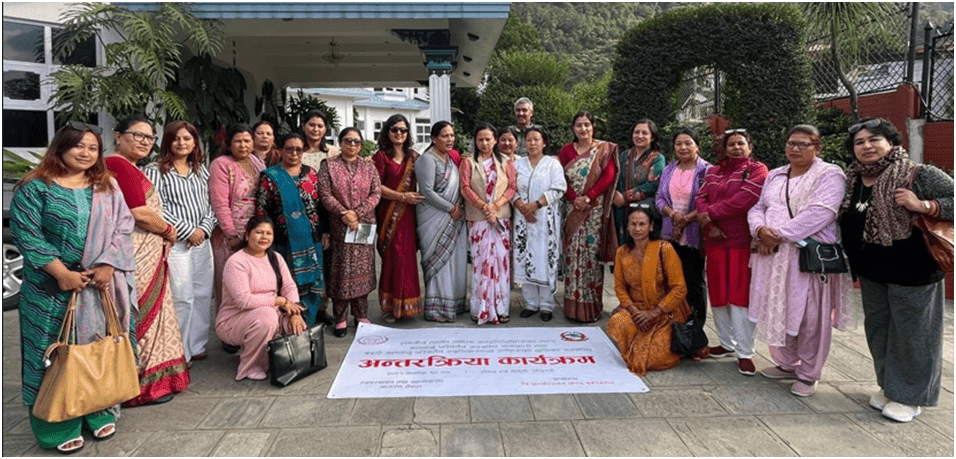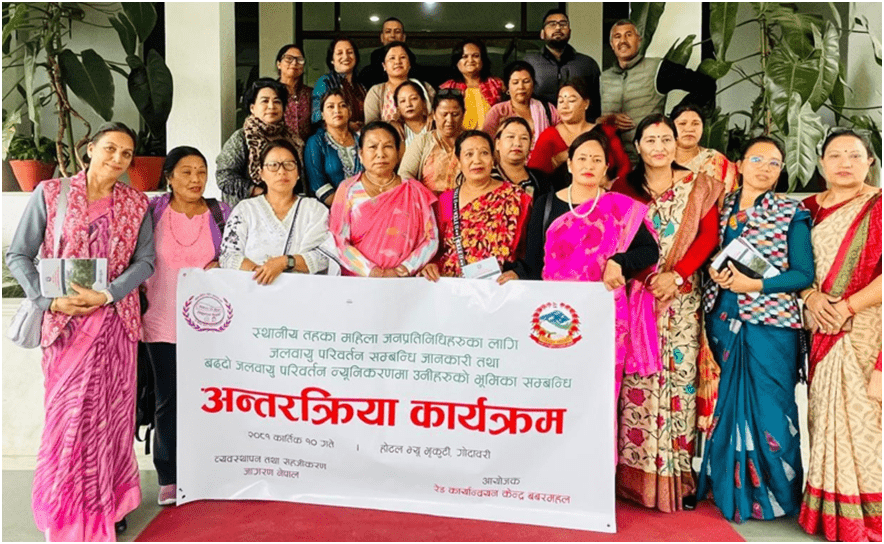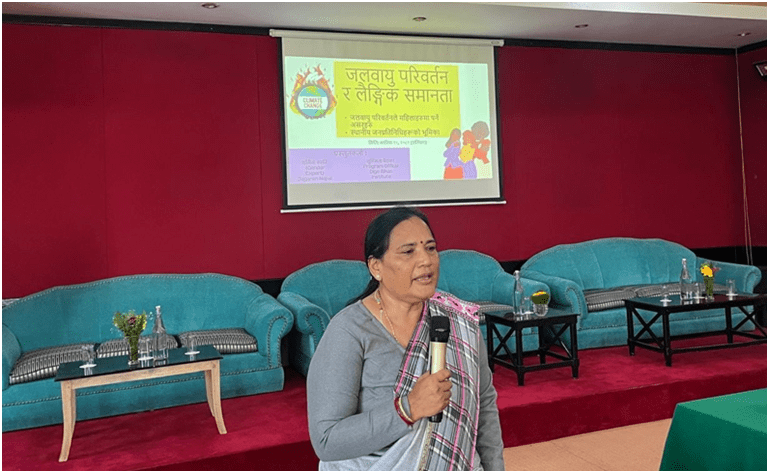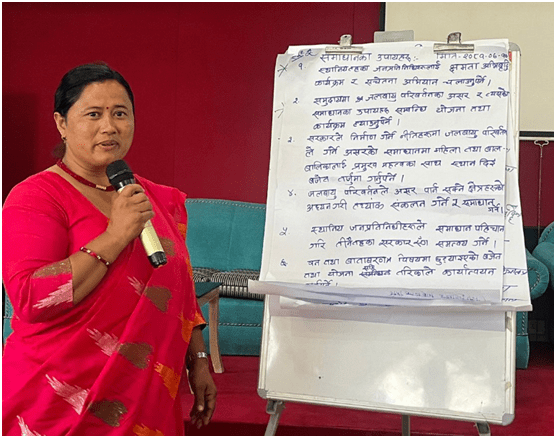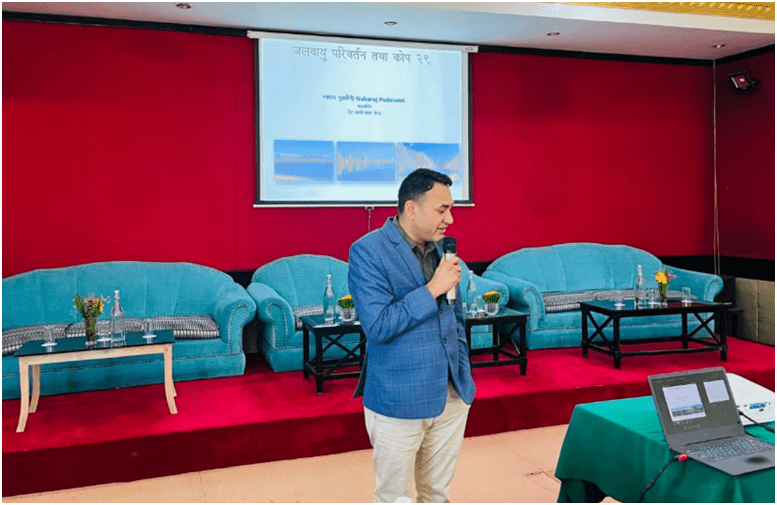Interaction Program Climate Change and its Impact at Grassroots and role of Local Women Representatives in addressing Climate Change
REED Implementation Center (REED-IC) under the Ministry of Forest and Environment (MoFE) in partnership with Jagaran Nepal on 26th October, 2024 (10th Kartik, 2081) successfully organized an interaction program titled “Climate Change and its impact at Grassroots and the Role of Local Women Representatives in addressing Climate Change.”
Objective of the Workshop:
- To raise awareness among local women representatives about climate change, its impacts and other topics surrounding climate change.
- To highlight the importance of incorporating gender-sensitive approaches in climate policies that address the disproportionate burden on women.
- To empower female representatives with the knowledge and tools to advocate for and implement adaptive climate action at the local level.
Navaraj Pudaisani, Joint Secretary, REDD Implementation Centre, Government of Nepal, took over the first technical session of the event. The presentation began with a brief introduction about climate change- its causes and effects. He also talked about the existing policies, laws and regulation of Government of Nepal with regards to climate change. He said ,”Nepal government embraces two strategies – Mitigation and Adaption- to deal with climate change impact”. At local level, the priority is given to adaptation rather than mitigation and REDD-IC is the only legitimize entity that focuses on mitigation efforts for climate change in Nepal and also explained how REDD-IC works.
In his presentation, he shed light on international forest carbon credit trading that Nepal indulges in. In recent past, Nepal government has been able to earn foreign exchange through carbon credits. Between 2018-2022, Nepal earned NRS 1 Arab 60 Crores from carbon trading projects. Pudasaini mentioned that the money generated from carbon trading sources is mandated to be solely used for local level interventions to combat climate change. He further added that Nepal is the first country in South Asia to work in carbon trading.
Sharmila Karki started off the second session by establishing the fact that the nexus between gender equality and climate change has not been paid enough attention to in Nepal. Climate change affects women more than men in any settings – rural or urban. But we have failed to realize the narratives of climate justice while implementing interventions for climate action.
After the political transformation, Nepal has had many local women representatives at the grassroots. Despite this, women representatives have not been able to influence the decision-making process. Male dominance in decision making spaces is still highly prevalent in functions such as law formulation. Consequently, the challenges faced by women at the time of crises remain unaddressed. Unless we understand and adhere to the saying ‘no climate justice without gender justice’, the commitment of government will never become a reality. Susmita Baidwar highlighted why women are more vulnerable than their male counterparts. They attributed poverty, unequal access to resource, social structure, orthodox and stereotypical thinking to this tragedy.
Following the end of technical sessions, the participants were divided into three groups. As mentioned by the participants of the program, who were elected women representing of wards and municipalities, this was for most of them the first time engaging in capacity building programs about Climate Change, its impact and the Climate movement. Hence, based on this premise, the discussion in the group revolved around the topic role of federal, provincial and local level governments as well as organizations and institutions in order to address the issues of climate change and especially challenges faced by women due to climate change.
Some of the key recommendations generated from the group discussion were as follows:
- Increase information flow through capacity building programs and awareness campaigns for local level representatives especially municipal leaders i.e. mayors and deputy mayors, who are key decision makers to identify solutions and coordinate with all three levels of government.
- Increase local level representatives’ accessibility to experts on issues surrounding climate change.
- Government policies should allocate budgets with a primary focus on addressing the effects of climate change that prioritizes women, children, and other marginalized groups.
- Budget and plans that have already been allocated for climate, forest and environment issues should be implemented effectively.
- Research studies should be conducted to collect data that will help identify vulnerable areas and communities to climate change at the local level with the goals of providing localized solutions for climate action based on the generated evidences.
- School curriculums should include information on climate change and its impact to sensitize younger generation. Furthermore, incentivizing schools to organize programs in the form of debate, speech, art, essay writing competition on the issue can be an effective intervention to spread awareness.
- Principle of inclusive participation should be adopted in developing plans and policies like NAP and LAPA by all three levels of government to encapsulate the voices of all stakeholders.
- Government interventions should coordinate and collaborate with grassroots organizations, NGOs, networks and federations to design and implement climate and environment-friendly programs.
- Plans and programs should be introduced in communities that promote possible solutions to climate issues, linking it with health, education, livelihoods, disaster, and other socio-cultural issues while striking a delicate balance between technological and natural interventions.
Non-governmental organizations and institutions need to play the following roles:
- Facilitate coordination between government and community.
- Provide timely information and training on the subject especially targeting women.
- Encourage collaboration among awareness campaigns and capacity building trainings by highlighting the local needs, available resources and diversity.
- Motivate actions to address sustainable development goals, human rights, and women’s rights while addressing climate change
